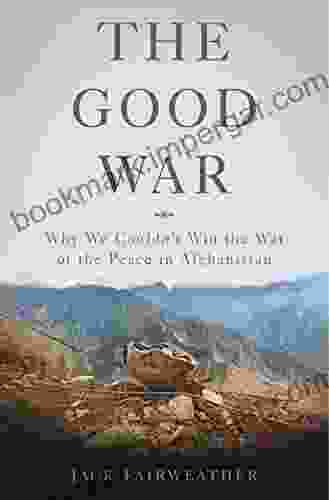Why We Couldn't Win the War or the Peace in Afghanistan: A Comprehensive Examination

The United States and its allies entered Afghanistan in 2001 with the stated goals of toppling the Taliban regime, preventing al-Qaeda from using the country as a base for attacks, and establishing a stable and democratic government. However, after 20 years of war and an estimated $2 trillion spent, the US and its allies withdrew from Afghanistan in 2021, leaving behind a country that was more unstable and dangerous than when they had first arrived.
There are many reasons why the US and its allies were unable to achieve their goals in Afghanistan. Some of these reasons include:
4.6 out of 5
| Language | : | English |
| File size | : | 4708 KB |
| Text-to-Speech | : | Enabled |
| Enhanced typesetting | : | Enabled |
| Word Wise | : | Enabled |
| Print length | : | 416 pages |
| Screen Reader | : | Supported |
- A lack of understanding of Afghanistan's history, culture, and politics. The US and its allies entered Afghanistan with a superficial understanding of the country's complex history, culture, and politics. This lack of understanding led to a number of missteps, including the decision to focus on military operations rather than on building relationships with the Afghan people and supporting local governance.
- A failure to develop a coherent strategy for Afghanistan. The US and its allies never developed a coherent strategy for Afghanistan. Instead, they pursued a series of piecemeal and often contradictory policies that failed to address the underlying causes of instability in the country.
- Corruption and mismanagement within the Afghan government. The Afghan government was plagued by corruption and mismanagement, which undermined its ability to provide essential services to the Afghan people and to maintain security. The US and its allies failed to adequately address the problem of corruption within the Afghan government, which contributed to the government's collapse in 2021.
- The rise of the Taliban and other insurgent groups. The Taliban and other insurgent groups were able to exploit the weaknesses of the Afghan government and the lack of a coherent US strategy to make gains on the battlefield. The US and its allies failed to develop effective counterinsurgency strategies that could defeat the Taliban and other insurgent groups.
The Consequences of Failure
The failure of the US and its allies to achieve their goals in Afghanistan has had a number of negative consequences. These consequences include:
- The loss of American and allied lives. Thousands of American and allied soldiers were killed or wounded in Afghanistan. The loss of these lives is a tragedy that cannot be forgotten.
- The suffering of the Afghan people. The Afghan people have suffered greatly as a result of the war in their country. Millions of Afghans have been killed, injured, or displaced from their homes. The war has also destroyed Afghanistan's economy and infrastructure.
- The rise of terrorism. The war in Afghanistan has created a breeding ground for terrorism. The Taliban and other insurgent groups have been able to use Afghanistan as a base to launch attacks against other countries, including the United States.
- The loss of US credibility. The failure of the US and its allies to achieve their goals in Afghanistan has damaged the credibility of the United States. This damage to US credibility will make it more difficult for the United States to achieve its goals in other parts of the world.
The war in Afghanistan was a tragedy for all involved. The US and its allies failed to achieve their goals in Afghanistan, and the Afghan people have suffered greatly as a result. The lessons learned from the war in Afghanistan should be used to improve US policy in other parts of the world.
4.6 out of 5
| Language | : | English |
| File size | : | 4708 KB |
| Text-to-Speech | : | Enabled |
| Enhanced typesetting | : | Enabled |
| Word Wise | : | Enabled |
| Print length | : | 416 pages |
| Screen Reader | : | Supported |
Do you want to contribute by writing guest posts on this blog?
Please contact us and send us a resume of previous articles that you have written.
 Book
Book Novel
Novel Page
Page Chapter
Chapter Text
Text Story
Story Genre
Genre Reader
Reader Library
Library Paperback
Paperback E-book
E-book Magazine
Magazine Newspaper
Newspaper Paragraph
Paragraph Sentence
Sentence Bookmark
Bookmark Shelf
Shelf Glossary
Glossary Bibliography
Bibliography Foreword
Foreword Preface
Preface Synopsis
Synopsis Annotation
Annotation Footnote
Footnote Manuscript
Manuscript Scroll
Scroll Codex
Codex Tome
Tome Bestseller
Bestseller Classics
Classics Library card
Library card Narrative
Narrative Biography
Biography Autobiography
Autobiography Memoir
Memoir Reference
Reference Encyclopedia
Encyclopedia J Keith Saliba
J Keith Saliba Kathryn Brown
Kathryn Brown Jack Billups
Jack Billups Isaiah Robinson
Isaiah Robinson Jack Shuler
Jack Shuler Jack Bei
Jack Bei Hugo Wilson
Hugo Wilson Scott Klusendorf
Scott Klusendorf Troy Southgate
Troy Southgate Octave Mirbeau
Octave Mirbeau Thorne Smith
Thorne Smith Hugh Harrop
Hugh Harrop Ian S Port
Ian S Port Susan Greenwood
Susan Greenwood Kenneth Kelly
Kenneth Kelly Saara Matala
Saara Matala Sally Engle Merry
Sally Engle Merry Jaime A Pineda
Jaime A Pineda Iain Jackson
Iain Jackson Hugh Sebag Montefiore
Hugh Sebag Montefiore
Light bulbAdvertise smarter! Our strategic ad space ensures maximum exposure. Reserve your spot today!

 Bryce FosterBedroom Design Ideas for Young Couples: A Comprehensive Guide and Inspiration
Bryce FosterBedroom Design Ideas for Young Couples: A Comprehensive Guide and Inspiration
 Christian CarterOxford Handbook of Public Health Practice 4e: A Comprehensive Guide to...
Christian CarterOxford Handbook of Public Health Practice 4e: A Comprehensive Guide to... Andy ColeFollow ·13.3k
Andy ColeFollow ·13.3k Gordon CoxFollow ·13k
Gordon CoxFollow ·13k Jason HayesFollow ·8.9k
Jason HayesFollow ·8.9k Art MitchellFollow ·19.9k
Art MitchellFollow ·19.9k Arthur Conan DoyleFollow ·18.8k
Arthur Conan DoyleFollow ·18.8k Brent FosterFollow ·7.3k
Brent FosterFollow ·7.3k Desmond FosterFollow ·19.9k
Desmond FosterFollow ·19.9k Isaac AsimovFollow ·4k
Isaac AsimovFollow ·4k

 Mike Hayes
Mike HayesUnlock Your Nonprofit Potential: A Comprehensive Guide to...
: Embarking on the Path to Impactful...

 Cody Russell
Cody RussellUnlock the Secrets of Captivating Radio Programming:...
In the fiercely competitive world of...

 Aron Cox
Aron CoxUnveiling the Enchanting World of Beth Inspired Eye...
A Realm of Imagination and Wonder Embark on...

 Felix Carter
Felix CarterUnlock the Secrets of Legal Publishing with West Hartford...
West Hartford Legal Publishing, the renowned...

 Henry Hayes
Henry HayesUnveiling the Secrets of the Panama Papers: Exposing...
The Panama Papers is a groundbreaking...
4.6 out of 5
| Language | : | English |
| File size | : | 4708 KB |
| Text-to-Speech | : | Enabled |
| Enhanced typesetting | : | Enabled |
| Word Wise | : | Enabled |
| Print length | : | 416 pages |
| Screen Reader | : | Supported |










